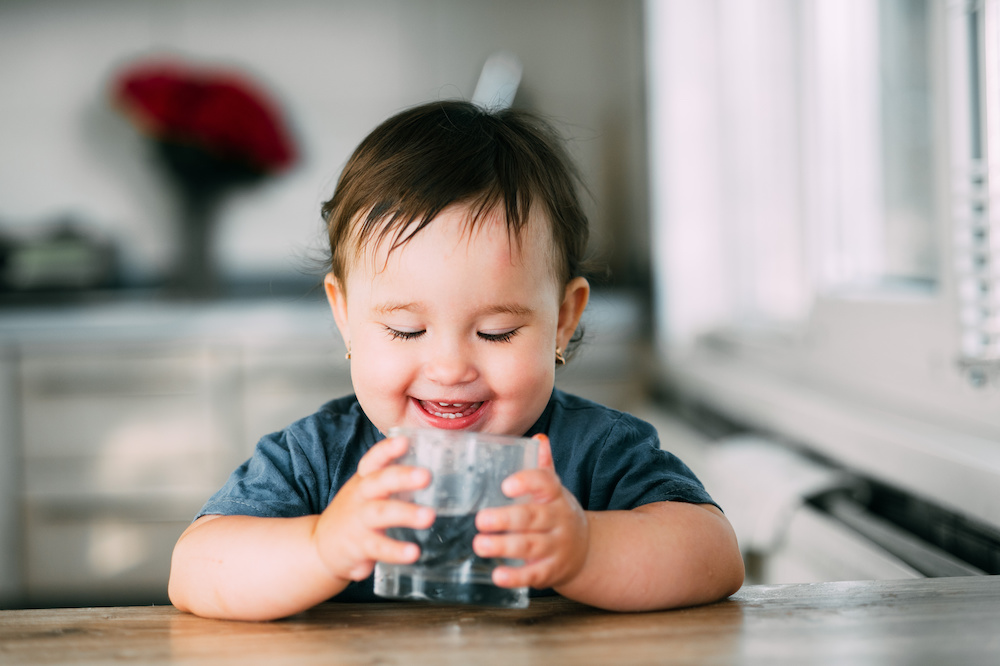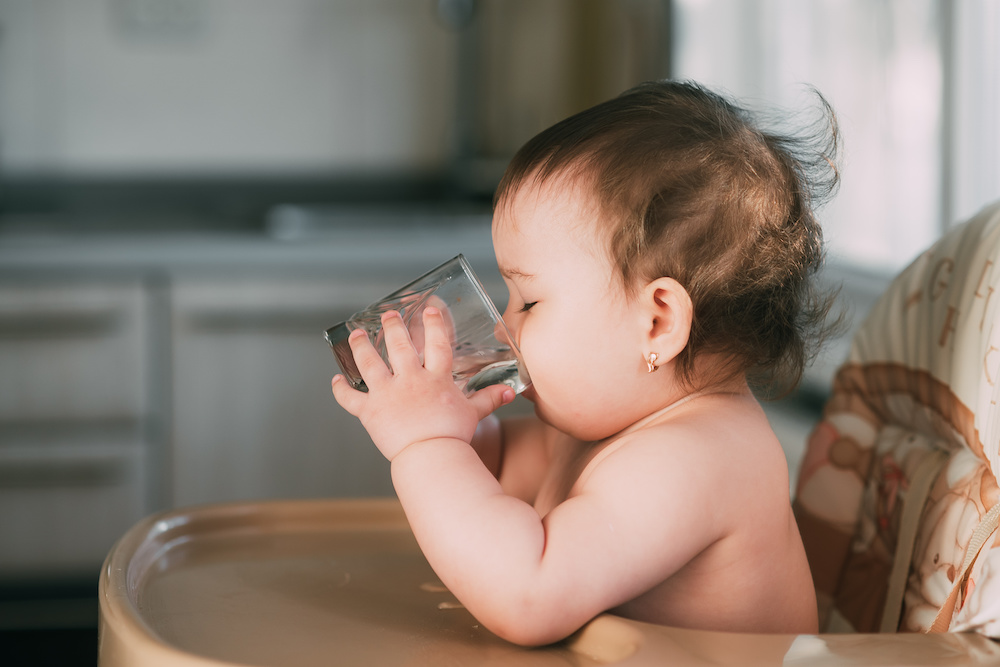As parents, we always want the best for our children to ensure their health, wellness, and longevity.
Since hydration plays a crucial role in our lives, it is only natural for parents to consider all the options available.
This leads many parents to wonder and ask, “Can babies drink alkaline water?”
To find the right answer, let’s discuss how alkaline water compares with regular tap water, the potential benefits of letting your baby drink alkaline water, and more.
What’s Wrong With Tap Water?
Tap water isn’t the best choice for drinking water because of the potential for contaminants.
According to the World Health Organization, at least two billion people are exposed to contaminated drinking water every day.
The health issues that people are at risk of due to water impurities are diarrhea, typhoid, and polio, just to name a few.
We are very fortunate here in the United States to have one of the most reliable public water systems in the world.
At the very least, all of our public water systems follow the standards set by the United States Environmental Protection Agency (EPA).
However, those standards are set based on economics and not necessarily optimal health. There are also a large number of contaminants that they do not even test for.
That said, contamination often happens after treatment, in the process of getting the water to you.
For instance, those who live near industrial complexes are at risk of having their drinking water accidentally contaminated by waste materials and heavy metals.
Meanwhile, those who get their drinking water from private wells may be exposed to other forms of pollutants.
It is also worth noting that EPA does not monitor these private and individual water systems.
To make matters worse, babies are especially at risk, according to the Centers for Disease Control and Prevention.
The same is true for young children, the elderly, pregnant women, and those with immunocompromised immune systems due to a medical condition.
For these reasons, it might be ideal to consider other types of water for you and your family’s daily hydration.
What Is Alkaline Water?
One of the most commonly considered options is alkaline water, thanks to its many health benefits.
Alkaline water is a form of processed water that contains higher pH levels compared to normal water.
It may also contain more minerals, particularly those that are alkalizing, such as calcium and magnesium.
A substance’s pH level is measured using a scale of zero to 14. The lower the pH level is, the more acidic the substance.
A pH level of seven, which is in the middle of the scale, is considered neutral.
Meanwhile, your water should reach a pH level of eight or slightly higher to be considered alkaline.
What Are the Benefits of Drinking Alkaline Water?
Alkaline water is safe to consume as long as it falls within EPA’s recommended pH levels (6.5 to 8.5) and comes from a reliable source.
But what makes alkaline water popular is its numerous suggested health benefits. Here are just some of them:
1. Alkaline water prevents cellular and bone degeneration.
A study found that an alkaline diet and water help protect your pancreas’ beta cells, improving its antioxidant effects.
Another study found that regularly drinking alkaline water can improve bone mineral density and help with osteoporosis.
2. Alkaline water can help treat acid reflux.
Reflux disease is caused by an enzyme called pepsin, but its presence alone isn’t the only factor that leads to reflux. After all, this enzyme still needs to be triggered by acid.
Fortunately, there is a possibility that you can prevent reflux activation from happening by drinking alkaline water.
In a study published by the Annals of Otology, Rhinology, and Laryngology, it was found that drinking alkaline water with a pH level of 8.5 has an acid-buffering ability, which is enough to even deactivate pepsin.
3. Alkaline water can improve blood flow even in a dehydrated state.
Decreased blood viscosity can be an issue after strenuous physical activity. Hydrating can surely help, and you might want to consider alkaline water for the task.
According to a published Journal of the International Society of Sports Nutrition paper, alkaline water helps provide efficient post-workout hydration.
It can even improve blood viscosity better than standard purified water.

Can Babies Drink Alkaline Water?
Indeed, we cannot ignore all the potential benefits of alkaline water, but here’s the important question: can you give it to your baby?
To be completely transparent, there isn’t enough scientific research to back the claim that alkaline water is as beneficial for infants as it is for adults.
We have not found any studies revealing negative effects either. Hence, at the very least, health professionals seem to agree that alkaline water is likely safe for babies.
That said, the best step is to consult your doctor before giving your child alkaline water.
Some Pointers to Keep in Mind
We also recommend keeping the following pointers in mind when introducing alkaline water to your baby:
1. Don’t use plastic bottles.
We discourage giving your baby alkaline water from a plastic bottle.
According to recent studies, plastic bottled products may be part of the culprits behind our exposure to micro plastics.
Unfortunately, human exposure to this threat seems inevitable.
Case in point: a study tested stool samples from eight different countries across the globe. The result was across the board.
Every sample had traces of micro plastics. It didn’t matter whether the participant came from Japan, Finland, or the UK; the results stayed consistent.
However, this doesn’t mean we should give up minimizing our child’s exposure to it whenever we can, right?
Indeed, the plastic contamination of our drinking water is a global problem.
Fortunately, there are steps that our water suppliers and regulators can take, according to the World Health Organization.
We can also invest in our own water purification systems.
2. Avoid giving your child alkaline water half an hour before and after meals.
Alkaline water can potentially neutralize stomach acid, which can then interfere with digestion and even cause gastrointestinal distress.
To be safe, it would be wise to wait at least 45 minutes after a meal before giving your baby alkaline water.
3. Don’t use alkaline water to prepare your infant’s formula or baby food.
This is due to the same reasons we have just mentioned. Filtered and purified water are great alternatives.
If you’re worried about potential contaminants in your water, you may boil it to make it safer for your baby to consume.
Boiling is a good way to ensure that any lurking bacteria and viruses in your water get destroyed.
Are you wondering whether you can boil alkaline water or not? Then you will be pleased to learn that, yes, you can boil it.
The process won’t impact its alkalinity and, as such, its health benefits. Just keep in mind that water with higher pH levels boils faster.
4. Avoid giving your baby alkaline water if the little one is on certain medications.
There are minerals in alkaline water that might cause a negative interaction. It is one of the reasons we recommend consulting your doctor before introducing it to your baby’s diet.
5. The recommended volume of alkaline water consumption will depend on your child’s age range.
For instance, eight ounces of alkaline water daily is enough for a newborn up to six months old.
You can add more (up to 16 ounces) as your baby gets older and as the little one’s pediatrician allows.
Here’s a quick tip: don’t just decide that you’re going to add alkaline water to your baby’s diet one day. Instead, try to start in small amounts and gradually increase as the little one’s body adjusts.
6. Breast milk is still the best.
While hydration is essential at any age, the World Health Organization still recommends breastfeeding your baby exclusively for the first six months of the child’s life.
It is still the best way to ensure your child’s optimal development, as they have found through their comprehensive systematic reviews.
You may then start supplementing your child’s diet with other healthy food and drink options (alkaline water included) once the little one reaches six months.
However, some even recommend breastfeeding until two years of age and, if possible, even beyond.
What Does Alkaline Water Taste Like?
Here’s a common parental concern. Taste. Will your little one enjoy drinking alkaline water?
You don’t have to be a parent to know that not everyone enjoys drinking water.
Many adults can still struggle with this, so it’s normal that some kids are picky when it comes to their drinking preferences.
Fortunately, alkaline water can help. It has a sweet, fresh, and spring-like taste.
In our honest opinion, alkaline water is one of the tastiest out there. It can be a great option to encourage a non-water fan to convert.
Introducing Alkaline Water to Your Baby
We can’t ignore the current trends surrounding alkaline water among fitness circles. Some people even consider it a health drink.
We are not surprised. After all, alkaline water has a lot to offer in terms of reported health benefits.
Can babies drink alkaline water? Yes, they can. However, we highly recommend consulting your pediatrician if this is the best hydration option for your child.
At the very least, we know that breast milk is still the ideal choice for zero to six months old.Can Babies Drink Alkaline Water

